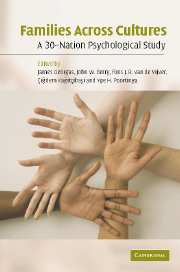Book contents
- Frontmatter
- Contents
- List of figures
- List of tables
- List of contributors
- Acknowledgments
- Prologue
- Part I
- Part II
- 9 The Algerian family: change and solidarity
- 10 Botswana
- 11 The Brazilian jeitinho: Brazil's sub-cultures, its diversity of social contexts, and its family structures
- 12 Britain
- 13 Bulgaria: socialism and open-market economy
- 14 Canada
- 15 Chile: new bottle, old wine
- 16 Cyprus
- 17 Portrait of family in France
- 18 Georgia
- 19 Germany: continuity and change
- 20 Ghana
- 21 Greece
- 22 Hong Kong, SAR China: transitions and return to the motherland
- 23 India
- 24 Indonesia: traditional family in a changing society
- 25 The Iranian family in a context of cultural diversity
- 26 Japan: tradition and change in the Japanese family
- 27 Mexico
- 28 Mongolia: traditions and family portrait
- 29 The Netherlands: tolerance and traditionalism
- 30 Nigeria
- 31 Pakistan: culture, community, and filial obligations in a Muslim society
- 32 The Saudi society: tradition and change
- 33 The South African family
- 34 South Korea
- 35 Spain: tradition and modernity in family structure and values
- 36 Turkey
- 37 Ukraine
- 38 Family in the United States: social context, structure, and roles
- Appendix
- References
- Index
36 - Turkey
Published online by Cambridge University Press: 10 December 2009
- Frontmatter
- Contents
- List of figures
- List of tables
- List of contributors
- Acknowledgments
- Prologue
- Part I
- Part II
- 9 The Algerian family: change and solidarity
- 10 Botswana
- 11 The Brazilian jeitinho: Brazil's sub-cultures, its diversity of social contexts, and its family structures
- 12 Britain
- 13 Bulgaria: socialism and open-market economy
- 14 Canada
- 15 Chile: new bottle, old wine
- 16 Cyprus
- 17 Portrait of family in France
- 18 Georgia
- 19 Germany: continuity and change
- 20 Ghana
- 21 Greece
- 22 Hong Kong, SAR China: transitions and return to the motherland
- 23 India
- 24 Indonesia: traditional family in a changing society
- 25 The Iranian family in a context of cultural diversity
- 26 Japan: tradition and change in the Japanese family
- 27 Mexico
- 28 Mongolia: traditions and family portrait
- 29 The Netherlands: tolerance and traditionalism
- 30 Nigeria
- 31 Pakistan: culture, community, and filial obligations in a Muslim society
- 32 The Saudi society: tradition and change
- 33 The South African family
- 34 South Korea
- 35 Spain: tradition and modernity in family structure and values
- 36 Turkey
- 37 Ukraine
- 38 Family in the United States: social context, structure, and roles
- Appendix
- References
- Index
Summary
A HISTORICAL OUTLINE OF TURKEY
The Republic of Turkey was established in 1923 after the overthrow of the Ottoman sultan, the Islamic caliphate, as a secular nation state with a parliamentary government. Its present day population is approximately 67 million. Istanbul is the largest city with about 10 million inhabitants, and Ankara, the capital, is the second largest city with about 4 million inhabitants. The history of Turkey consists of, first, the history of Anatolia before the coming of the Turks and of the civilizations – Hittite, Thracian, Hellenistic, and Byzantine. Second, it includes the history of the Turkish peoples, including the Seljuks, who brought Islam and the Turkish language to Anatolia. Third, it is the history of the Ottoman Empire. Finally, Turkey's history is that of the Republic established in 1923.
ECOLOGICAL FEATURES
Turkey is situated on the northeastern Mediterranean basin with 800,000 km2 of land, 97 percent of which lies in the Anatolian Peninsula, Asia, and 3 percent in Thrace, Europe. The coastal regions are characterized by a Mediterranean climate with hot and humid summers, and mild and rainy winters, while the inland is cold and snowy in the winter and hot and dry in the summer.
ORGANIZATION AND INSTITUTIONS OF SOCIETY
Economic organization
The Turkish society is in a rapid transformation from a traditional, rural, agricultural, patriarchal society to a modern, urban, industrial, and egalitarian one.
- Type
- Chapter
- Information
- Families Across CulturesA 30-Nation Psychological Study, pp. 467 - 474Publisher: Cambridge University PressPrint publication year: 2006
- 22
- Cited by

